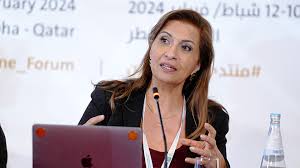Institute of Culture and Society, Western Sydney University, “Taking action for Palestine in Academic and Cultural Institutions”, 11 April 2024
Last month, the Hebrew University of Jerusalem suspended Professor Nadera Shalhoub Kevorkian, of the Faculty of Law and Institute of Criminology and the School of Social Work for denouncing the Gaza genocide and casting doubts on the Hamas rape allegations. The university justified the suspension by saying it would “preserve a safe climate on campus.” Shalhoub Kevorkian, a world-renowned Palestinian scholar and author of numerous books, whose research focuses on trauma, state crimes, surveillance, gender violence, law and society, said in a recent podcast on Makdisi Street that she would never allow anyone to touch a baby, kidnap a child, or rape a woman: “not in my name; I would never accept it as a Palestinian.” Shalhoub Kevorkian had been in trouble before. After a paper she presented in 2019 claiming Israel tests weapons on Palestinian prisoners and Palestinian children to boost its international arms sales, and that “Palestinian spaces are laboratories for the Israeli security industry,” the Minister for Education called for her dismissal. And last October she was under pressure to resign her position when she signed a call for immediate ceasefire in Gaza.
According to Bhambra et al, Western universities are key sites through which colonialism, colonial knowledge, and theories of racism have been produced, institutionalised and naturalised, and universities in the global north were founded and financed through the spoils of colonial plunder, enslavement and dispossession.
As an imperialist, colonial, race-making European project, Zionism has always relied on academic knowledge to deepen its hold on Palestine and racialize the Palestinians. Since the early days of the Zionist movement Jewish universities in Palestine were used as a state-building instrument, and were key to enabling the colonization of Palestine and the racialization of the Palestinians. University education in Israel and occupied Palestine actually takes place in areas from which Palestinians were expelled. Thus Ben Gurion University in the Naqab is located in Be’er Sheva, the renamed Palestinian Bir Saba occupied by the Zionists on October 21 1948; 5,000 Palestinian were driven out at gunpoint to Hebron and many were shot; Tel Aviv University stands on the grounds of the depopulated Palestinian village Sheikh Muwannis, one of whose houses is the faculty club; the Hebrew University’s Mount Scopus campus is on Palestinian land occupied in 1967 – HUJI benefits from settlement infrastructure, transport lines and access roads in the occupied territory, some of them on privately-owned Palestinian land; and most infamously, Ariel University is built in the illegal Israeli colony-settlement Ariel in the occupied West Bank.
There are several historical and current aspects of the Israeli academy’s complicity with the colonisation of Palestine. According to Israeli sociologist Uri Ram, Israeli universities were always central to Zionism’s statist approach and Zionist academics have always maintained white European Jewish supremacy, and produced policies of colonization, of the racialization of the Palestinians as racially inferior to Israeli Jews, Jewish immigration, forging Jewish identity and denigrating “Israeli Arab” identity, the 1948-1966 military government regime, and Zionist land ownership. Since the 1967 occupation, academics have been ever more central to policies of occupation and settlement, segregation and apartheid, domination and military prowess.
According to the Palestinian Academic and Cultural Boycott of Israel (PACBI), the current Gaza genocide, in which between 40,000 and 50,000 Palestinians were murdered and 80 per cent of Gaza has been rendered inhabitable, has elicited the support of most Israeli universities. Universities offer faculty and student reserve soldiers actively involved in the killing fields of Gaza various perks and privileges as rewards for their contribution to the war effort and the state’s “security.” This discriminates against Palestinian students, most of whom are not conscripted to the IDF and are thus not eligible for university grants and deferred exam dates available to serving Israeli student soldiers. Israeli academics are no different from the rest of Jewish-Israeli society, where 95% justify the bloody assault on the Palestinian people in Gaza, according to a recent poll.
The complicity of the Israeli academy is evidenced in several ways. Israeli universities and third level institutes of science and technology are central to developing and manufacturing Israel’s weapons and security systems, training military and security personnel, and providing theoretical backing for the Israeli occupation. At the same time, Israel exercises control and surveillance over academic institutions in occupied Palestine, curtailing students’ and academics’ freedom of movement and the actual freedom to educate Palestinians at all levels. Having successfully recruited Israeli academics as active collaborators in the colonisation of Palestine, Israel stymies free debate on the Israeli colonization of Palestine. In highlighting the importance of the academic boycott of Israeli institutions, I want to debunk the belief that Israeli academics are “progressive,” and should not be boycotted.
Beginning with Israeli universities’ role in manufacturing arms and security systems, Israeli anthropologist Jeff Halper argues that Israel transforms “its military and securocratic prowess into political clout in pursuing… ‘security politics’.” As argued by Jewish Australian journalist Antony Loewenstein, The occupied Palestinian territory serves as a testing ground for the development of weapons, tactics, security systems, and models of population control without which Israel would be unable to compete in international arms and security markets.
Israel’s weapons and security industries could not succeed without the active collaboration of academics and universities – one wonders whether the AI programme Lavender which targeted Hamas operatives but bombed them in their family homes killing whole families, was developed in collaboration with Israeli academics. Israeli academia also provides training for the arms industry, training thousands of engineering and science students in the security system’s R&D centres; they later return to the civilian market, consolidating the capitalist links between the universities and the security industries.

Academics also provide theoretical grounding for new IDF warfare modes. Israeli forensic architect Eyal Weizman quotes Tel Aviv University philosophy professor (and retired IDF brigadier-general) Shimon Naveh, who was instrumental in designing the IDF’s “swarming” mode of urban warfare, a non-linear polycentric strategy first developed by the US army, and a central component of the IDF’s attacks on refugee camps and densely populated urban centres in Gaza and the occupied West Bank. In Yotam Feldman’s documentary The Lab, Naveh boasts of having designed a phantom city in the southern Negev region, where the IDF practices urban warfare.
Some Israeli universities are more directly involved with the occupation. Ariel University is party to Israel’s highly lucrative arms and security industries through partnering with weapons manufacturer Israel Aerospace Industries (IAI) in joint research employing nanotechnology to develop miniature satellites.
Second, all Israeli higher education institutions provide training programmes for military and security personnel. On the lowest level, the Israeli College for Security and Investigation prepares graduates to work in Israel’s multi-faceted privately run security industry. More prestigious institutions – such as the flagship Command and Staff College, which provides military and academic training programmes in several Israeli universities – enjoy close relationships with Israel’s security and secret service agencies.
An example of on campus training is the Hebrew University’s Havatzalot programme for military intelligence officers for which the IDF constructed a highly secured military installation on campus with the military deploying surveillance technologies that affects everyone on campus, where hundreds of uniformed and armed soldiers in departments of Islamic and Middle Eastern Studies, Political Science and Philosophy receive preferential treatment, and where high-ranking uniformed officers attend classes and affect their contents, turning part of the campus into a military base.
Third, Israeli universities play an active role in forming occupation policies. A notorious example is the Haifa University professor of Demography and Geo-strategy Arnon Sofer, who has authored policies regarding the West Bank Separation Wall, the Palestinian Right of Return, and Israel’s “demographic problem” – the high birth rate amongst Palestinians. Sofer’s comments on Gaza in 2004 sound particularly sinister during the current Gaza genocide:
We will tell the Palestinians that if a single missile is fired over the fence, we will fire ten in response. And women and children will be killed and houses will be destroyed… it’s going to be a human catastrophe. Those people will be even bigger animals than they are today, with the aid of an insane fundamentalist Islam… So, if we want to remain alive, we will have to kill and kill and kill. All day, every day.
Fourth, Israel controls Palestinian higher education by regularly raiding and shutting Palestinian universities and colleges in the West Bank and bombing educational institutions in Gaza, and by setting limits on the academic freedom of individual academics within the state of Israel, where Palestinian students face many barriers to accessing university education. These barriers include low proficiency in Hebrew and English, insufficient preparation for university entry exams, accessibility, economic difficulties, and Palestinian students’ relatively young age compared to Israeli students who go to university after military service. Barred from many government posts and from taking courses such geography for “security reasons,” Palestinian students tend to study medicine and nursing, pharmacy, natural sciences, and engineering. Politically active Palestinian students in Israeli universities are often harassed. According to 24-year-old law student Riham Nassra, this “can end in suspension, probation or even expulsion… They probably think that personal targeting will serve as more effective deterrence.”
In the occupied West Bank the Israeli military routinely raids and closes Palestinian higher education institutes and attacks school and university students. These raids have intensified since the onset of the Gaza genocide – since October 7 at least 394 Palestinians (including 100 children) have been killed and 7,350 others have been detained by the Israeli army, while Bir Zeit University has been attacked and students shot.
In addition to attacks on the UN Palestinian refugee agency UNRWA in Gaza that led to many western donor states defunding it, Israel has been trying to replace UNRWA-run schools in occupied East Jerusalem and force them to teach the Israeli curriculum, eroding Palestinian educational autonomy, further extending Israeli colonial control.
Equally damaging is the Israeli policy of imposing entry and residency restrictions on international academicswith foreign passports working in Palestinian universities. According to the Palestinian Ministry of Education, over half of all foreign staff in eight universities have been affected, causing serious disruptions to academic programmes.
Israel’s colonial control of Palestinian academic institutions has peaked during the Gaza genocide in the massive destruction of universities, medical and engineering laboratories, training courtrooms in faculties of law, assembly and graduation halls, cultural heritage sites, libraries, archives and museums. This has been theorised by Professor Karma Nabulsi of Oxford University as “scholasticide.” Since October 7 Israel has bombed and destroyed Gaza’s 12 universities and some 378 schools, and the Palestinian Ministry of Education has reported that some 4,327 students, 231 teachers and 94 professors and deans were killed. Targeting Gaza’s Palestinian intellectual elites aims to destroy Palestine’s future, in line with settler colonialism’s goal of eliminating the natives. This is not new: the same logic was exercised in the 1948 Nakba when thousands of Palestinian books, manuscripts, libraries, archives, photographs, cultural artefacts and cultural properties were looted, destroyed or damaged by Zionist militants, while Palestinian schools were destroyed and reappropriated for use by the Israeli state.
Besides the Israeli academic complicity with the colonisation of Palestine and Israel’s control over the Palestinian higher education sector, Israeli academics also collude in the silencing of criticism of Israel’s policies of apartheid, colonisation, occupation and genocide. This collusion has intensified since the October 7 Hamas act of resistance after which many liberal Zionists have been refusing to admit that Israel is committing genocide in Gaza, citing the Hamas attack as the greater of all evils, upholding Zionism’s twin building blocks: Jewish victimhood and white Jewish racial supremacy.
*
Following an international campaign, Professor Shalhoub Kevorkian has been reinstated by the Hebrew University that claimed she has “clarified” her initial statement. In a move typical of the continuing collusion of Israeli academics in the colonisation of Palestine, HUGI political scientists Elazar and Podoksik criticise the university for stymieing “academic freedom,” but not for its support for the Gaza genocide.
Controlling freedom of speech in relation to the colonisation of Palestine is not confined only to Palestinian academics; Israeli universities also censure anti-Zionist Israeli Jewish academics. When Tel Aviv University Philosophy lecturer Anat Matar posted on Facebook a eulogy for the late Palestinian prisoner Waleed Daqa who died of cancer in an Israeli jail in April 2024 after serving more than 38 years for his part in the murder of the Israeli soldier Moshe Tammam in 1984 and who Israel refused to release on medical grounds, the Education Minister demanded her dismissal from her university post. As Haaretz journalist Rogel Alfer wrote, Matar did not justify the murder but rather wrote about Daqa as an inspiring, dear friend, and an intellectual. He added that Matar has the right to be anti-Zionist and regard Daqa as a victim of Zionist oppression, racial discrimination and state cruelty; she also has the right to regard Palestinian prisoners as political, rather than “security” prisoners.

*
The Academic Boycott of Israeli higher education institutions is an important part of the overall struggle for the decolonisation of Palestine. Some people argue that Israeli universities are a haven of free inquiry and liberal dissent, and that the academic boycott is unfair since it targets all Israeli academics – even though it is institutional rather than individual. However, the boycott is a tactic, not a principle, and it can do Israeli academics no harm. Remember that all Israeli academics, very few of whom are critical of their government’s permanent war against the Palestinians, actually benefit from the colonization of Palestine through access to European Union and other research funding, and through their advantageous position in Israel’s academic institutions in comparison with their Palestinian counterparts. According to Maya Wind, most liberal Israeli academics have joined their right wing colleagues in opposing PACBI’s academic boycott campaign, and have actually formed countercampaigns, backed by Israeli state funding and talking points, intent on naming all criticism antisemitic. The refrain is always the same: “injustices committed against Palestinians may or may not exist; but even if they did, this has nothing to do with us.”
The Gaza genocide renders Israeli academic demurring absurd, and academics should join in boycotting Israeli institutes of higher education and support Palestinian universities, academics and students in Palestine and elsewhere.


You must be logged in to post a comment.